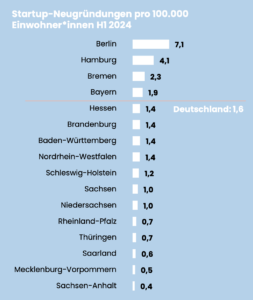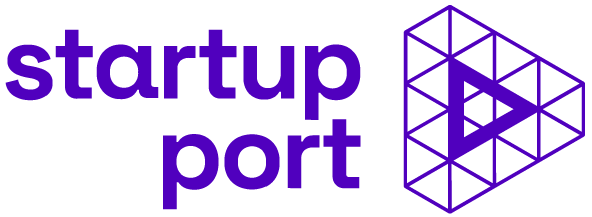The startup scene in Germany is experiencing a new upswing: In the first half of 2024, there were 15% more startups than in the second half of 2023. Hamburg is characterized by a high density of startups. This is confirmed by the latest data from the report series “Next Generation – Startups in Germany”, published by the Startup Association and startupdetector.
Things have been looking up again since January!
In the past six months, 1,384 start-ups were founded. This shows that The German startup ecosystem is regaining momentum. After the sharp decline in mid-2022, things are now looking better again. Berlin, Bavaria and North Rhine-Westphalia are leading the way in terms of start-ups. There is a clear upward trend, especially in NRW (up 25%) and Berlin (up 28%).
Software is all the rage
The key sector is software – never have more start-ups been founded in this area than in the past six months. Of the 1,500 new start-ups founded in the last six months, one in five came from the software sector. This shows how important digitalization is and how many people need innovative software solutions. Increasing digitalization and the use of artificial intelligence (AI) in particular are ensuring that a lot is happening here. Start-ups in this field are developing innovative solutions that make companies more productive and efficient. These solutions are particularly in demand in the B2B sector because they help companies to reduce costs and optimize processes. This proves how startups are making the German economy more digital, faster and more efficient.
Munich remains a central hotspot for the time being
Munich and Berlin are in an exciting neck-and-neck race: The two cities remain the central hotspots of the German startup ecosystem. More than a quarter of all new startups in the country are founded there (26%). Even though Berlin has the most start-ups in absolute terms, Munich has narrowly edged out the capital in terms of start-ups per capita over the last twelve months. Beyond the well-known hotspots, locations close to universities and research are the main drivers of start-up dynamics in the ecosystem.
Hotspots create momentum – potential in the regions
The city states – especially Berlin and Hamburg – are characterized by their start-up dynamics and a high density of start-ups. Hamburg has 4.1 start-ups per 100,000 inhabitants (- see chart).
Positive development can be seen almost everywhere
The positive trend in start-ups can be seen throughout Germany: there are not only more start-ups in the large metropolitan areas, but also in many smaller cities and regions. Three research-related start-up locations, namely Aachen, Darmstadt and Heidelberg, are among the five cities with the most start-ups per capita. This shows that regions away from the well-known start-up hotspots are also becoming increasingly important.
To the report:
The “Next Generation – Startups in Germany” report provides continuous, semi-annual monitoring of one of the key indicators of success in the German startup ecosystem. The series is based on data collected by startupdetector on new startups in Germany, which is based on commercial register data and has been collected since 2019.
The full report is available here.


